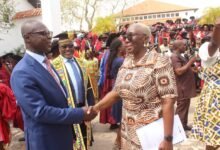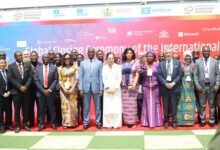Make AfCFTA information available to women-led MSMEs – panellists

Female panellists at a forum have underscored the need to increase awareness on African Continental Free Trade Area (AFCFTA) by making information available for women-led Micro, Small and Medium Enterprises (MSMEs).
This, according to the panellists, would enable women in MSMEs to obtain a deeper understanding of AfCFTA, as well as its benefits and opportunities.
They made the assertion during a panel discussion at the 2nd Public Private Dialogue organised by the Consumer Unity and Trust Society (CUTS–International), a policy think tank,with support from the German Development Co-orporation (GIZ) and AYA Institute in Accra yesterday.
It had the theme; “Making the African Continental Free Trade Area(AFCFTA) work for women-led MSMEs and traders in Ghana.”
The dialogue focused on how to practically enhance the capacity of women-led MSMEs to take advantage of the AfCFTA, following a research study conducted by AYA Institute for women with support from GIZ.
The research study titled,“Assessing the potential of women-led MSMEs in Ghana to take advantage of the AfCFTA,” revealed that majority of women traders and women-led MSMEs were not aware about AfCFTA.
Additionally, the research revealed an increase in price sales since the inauguration of AfCFTA, low level of expenditure on research and the adoption of innovative business approach among firms and traders.
The Head of Marketing, Ghana National Chamber of Commerce and Industry (GNCCI), Mrs Grace Akosua Pokua Dzeble, speaking on the issue of lack of information, noted that the AYA Institute was still mobilising information on women-led MSMEs.
However, she indicated that for women-led MSMEs to fully benefit from AfCFTA, there was the need to prepare them by deliberately taking steps to get them ready for export.
Positioning our business than just providing them with information, Mrs Dzeble said, would enable them compete effectively among African countries when they participate at the AfCFTA.
The Chairperson, Women in Agribusiness, Association of Ghana Industries (AGI), Mrs Fatima Ali Mohamed, challenged African leaders to address the fundamental issues such as food security, security of the citizens, finance as well as import and export, in order to meet the objectives of AfCFTA.
She explained that information was key and therefore urged African leaders to ensure that vital information on AfCFTA was shared to help women-led MSMEs benefit from it.
Additionally, Mrs Mohamed said “we need to move away from the ‘what is in it’ syndrome and start to think innovatively.”
For her part, Executive Director, Women of Africa Network, Mrs Audrey Biney said “I can see that there is more information out there but there is a lot more to be done.
It is a collective effort and the media have a responsibility when it comes to information about AfCFTA.”
Mrs Biney also indicated that it was important to communicate in the local dialect, in order for women-led MSMEs to better understanding the issues related to AfCFTA.
The Chief Executive Officer (CEO), Eye Express, Dr (Mrs) Naa Kowah A. Agyemfra urged government to formulate policies that could help women in the health sector liaise with educational institutions.
Prof. Godfred Bokpin from the University of Ghana Business School, said the country should be intentional and adopt approaches and strategies that would eliminate barriers in women-led MSMEs.
The West African Regional Director, CUTS, Mr Appiah Kusi Adomako in his welcome address said the dialogue was important as women play essential role in the economic and business sector.
BY BENJAMIN ARCTON-TETTEY







